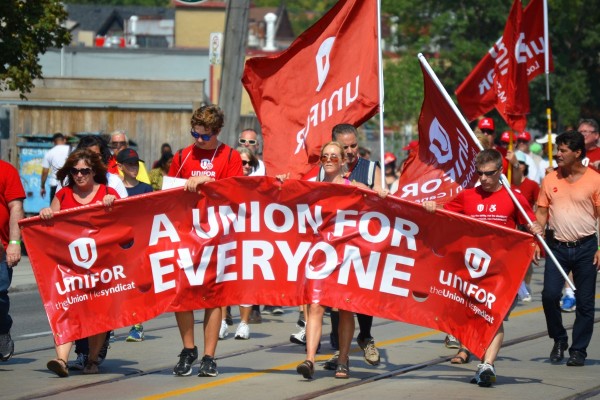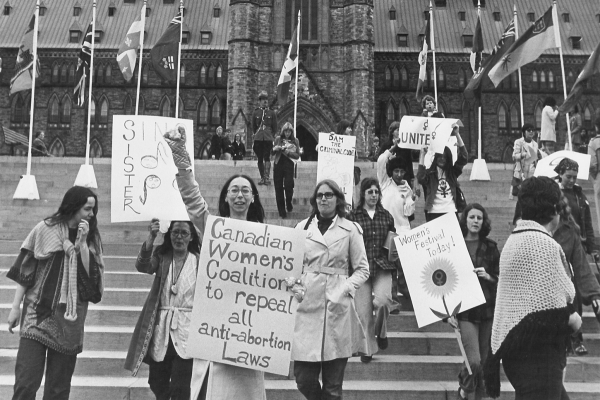Setting the record straight

Members of CUPE 3903 on strike at York University. Photo courtesy BlogTO.
This article is the continuation of an exchange between two actors in the recent York University Strike. This debate took place in the May/June 2009 issue of Canadian Dimension. To view the online version of this debate, please consider reading our editorial and the subsequent articles by Tyler Shipley and Tyler McCreary.
Tyler McCreary’s article for Canadian Dimension, “Tough union, tough lessons” would be a useful contribution to the important post-mortem of a strike ended wrong, if not for the fact that most of the evidence upon which his arguments are premised bears little resemblance whatsoever to the historical record.
McCreary argues that support from other sections of the labour movement was “lukewarm” and that this was a result of “self-aggrandizement and disdain for working with other unions” among Union leaders. Unfortunately, facts stand in the way of McCreary’s story: CUPE 3903 received well over $100,000 in support from over 125 different labour and community organizations across the country and the world, as documented in the treasurer’s end-of-year report. CUPE 3903 held a demonstration in downtown Toronto protesting the casualization of labour in all sectors in Ontario on Dec. 3, 2008, and dozens of unions and organizations from across the province sent people to bolster our numbers, culminating in a rally of hundreds of people that drew media attention to some of the most crucial issues at the heart of the strike. There are plenty of photographs showing all of the different flags flying in support of our action on that day and at others throughout the strike. Naturally, there is always room for improvement, and if McCreary had joined the efforts of other members to build upon our community support, he would have discovered just how happy the leadership was to give full cooperation with those efforts.
McCreary goes on to claim that the leadership of the Union “neglected the importance of regular representation of the membership in committees,” a suggestion that eschews even the simplest logic. Every committee in the Union is made up of members and there were upwards of 20 active committees operating in the strike encompassing hundreds of different members in various decision-making capacities. These committees’ responsibilities ranged from managing food and coffee for picketers to internal and external communications to liaising with allies in the labour movement to organizing phone trees and email lists. Among the many examples of members’ contributions to the strike are the brilliant mock-ads created by the video committee and circulated online. Arguably the most important committee in terms of day-to-day direction of the strike was the strike committee, which met nearly every day at staggered times and locations, and which solicited at least two representatives from each picket line – elected by those on the lines that day – and which made most of the significant decisions relating to strike and picket strategy.
McCreary further suggests that “leading members gleamed with revolutionary ardour…motivated by the dream of a general strike.” While this certainly reflects the mischaracterization offered by York’s administration and parroted by the Right in the Union in their efforts to de-legitimize the leadership, it offers nothing by way of concrete analysis. Indeed, if McCreary himself had spent more time participating in the meetings he claims didn’t happen, he might know that neither “revolution” nor “general strikes” were ever even mentioned. I invite him, as a member with access to the minutes of all meetings, to back up his claim by pointing to the moments where “the dream of a general strike” was inculcated into any of the decisions made during the strike.
While McCreary produces no shortage of fiery assertions and accusations to level at the leadership of the strike, he provides very little evidence to back up any of his claims. Mistakes were made during the strike, naturally, and a discussion of those mistakes is an important part of planning for future rounds of struggle. After reading McCreary’s piece, it seems clear to me that the post-strike discussions will need to include reflection on the mischaracterizations promoted by the Employer and the mainstream media and repeated uncritically by observers like McCreary.
While McCreary is not incorrect in noting that the climate and context of the recent CUPE 3903 strike was different from that of 2000-01, he fails to produce any sort of program for how the Union might have responded differently; following McCreary’s argument, presumably, CUPE 3903 should not have gone on strike at all since the climate in Ontario is less conducive to labour struggles at the moment. If that is, indeed, his claim then I can only reply that I, along with the thousands of members who first voted to go on strike and then voted again to remain on strike, disagree with that sort of defeatism.
Without any evidence to back it up, McCreary claims that 3903 leaders were arrogant vanguardists bent on revolution and out of touch with reality. York’s President Shoukri couldn’t have said it better, though he tried: immediately following the forced ratification vote in which thousands of members rejected the university’s offer, he spoke directly to 3903 members through the media, saying “your Union leaders have misled you… we have nothing left to offer and we will not be returning to the bargaining table.” This is not an uncommon management tactic – does McCreary think Union leaders should have gone against the will of an overwhelming majority of the membership and thrown in the towel? As it happened, the next step for CUPE 3903 was to significantly slash our demands in an effort to bring the strike to an end – hardly the basis for general strike or revolution.
Reflecting on the successes and failures of the strike is important, provided that the conversation is based upon the realities of CUPE 3903’s experience, rather than the anti-strike rhetoric that emerged in reaction to it. I engage with that discussion in my recent piece in Socialist Project, “Demanding the Impossible: The Future of Struggle in Post-Secondary Education,” and would encourage Tyler McCreary to reconsider his analysis in light of the facts and contribute in a more productive way to the project of preparing for future rounds of struggle.
Tyler A. Shipley is professor of culture, society and commerce at the Humber College Institute of Technology and Advanced Learning and author of Canada in the World: Settler Capitalism and the Colonial Imagination. The book is available to pre-order now. Learn more about the book on Twitter and Instagram.










